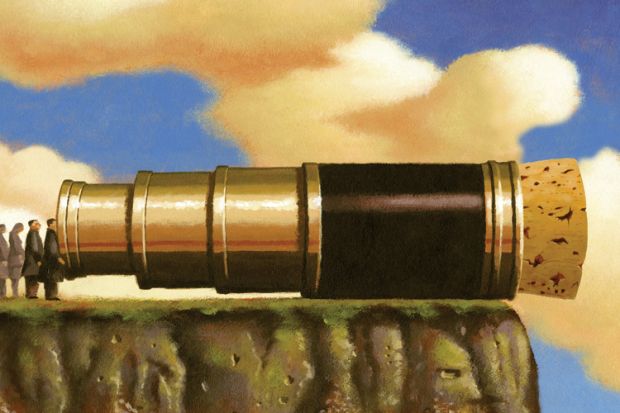Our myths and religions are full of cautionary tales about curiosity. Pandora, Daedalus, Psyche, Orpheus, Adam and Eve, Lot’s wife: they all succumbed to a curiosity that turned out to be calamitous. St Augustine, castigating himself for being waylaid from prayer by the tantalising sight of a dog running after a rabbit or a lizard catching flies, condemned curiosity as a “vain inquisitiveness” and a “diseased craving”. Even during the scientific revolution of the 17th century, when curiosity was finally transformed from a vice to a virtue, its advocates admitted that it could be a voracious beast if left unchecked and not channelled into worthy ends. Thomas Hobbes called it “a Lust of the mind” that “exceedeth the short vehemence of any carnall Pleasure”.
The modern university has inherited this ambivalence. We recognise that all intellectual work begins with curiosity, but we still retain St Augustine’s misgivings about directionless curiosity. No longer a sinful distraction from religious devotion, it has become a sinful distraction from the delivery of measurable outputs and impacts.
Even as an argument for relating academic knowledge to economic productivity, this makes little sense. As Ian Leslie argues in his 2014 book Curious, humans owe their success to their evolution of large brains with huge memories, which meant that, rather than finding things out when they needed to, like other animals, they could amass knowledge that might be helpful later. In a complex, fast-evolving world, it is particularly hard to know in advance what kinds of learning will be useful. So we need more than ever to be willing to undertake speculative intellectual ventures: to overcome the fear of failure and fasten on the unusual and serendipitous and see where it takes us.
As well as arguing that their role in promoting free-ranging curiosity is a sound financial investment, universities could argue that it also makes a significant contribution to the mental health of their students, staff and the public. Depression is, among other things, a blocking-off of our natural curiosity about the world, a turning inward against life, interest and meaning. No antidepressant has ever worked as well for me as the healing power of rekindled curiosity. “Curious”, after all, derives from the Latin “cura”, from which we also get both “cure” and “care”. That is what curiosity is: a curative for self-absorption and despair, and a way of caring about the world and laying down roots within it. As Alberto Manguel writes in his recent book Curiosity, it is “a means of declaring our allegiance to the human fold”.
The great disappointment of the internet is that it has not yet fulfilled its potential to encourage sustained, immersive curiosity. One of our tasks as lecturers is to persuade the internet generation that intellectual life involves hard thinking and blind alleys, and that the best way of finding something out might be to persevere beyond the purely instrumentalist, mouse-clicking search for information into the creative confusions of curiosity. The online world also tends to gravitate to extremes – either an echo chamber of like-minded souls retweeting and favouriting each other, or those below-the-line debates full of suffocating earnestness and pointless anger. Curiosity, by contrast, is intrinsically open-hearted and gentle, interested in relating to others but appreciative of their otherness. The best compliment you can pay someone is not to shower them with hyperbolic praise but simply to be curious about what they say and do. “Attention”, wrote the French philosopher and mystic Simone Weil, “is the rarest and purest form of generosity.”
Curiosity is life and hope in cerebral form. It exists in all animals, from the kitten with a ball of string to the monkey who will edge nervously towards a snake because its intense fear is still not as powerful as its inquisitiveness. In his 1964 book The Act of Creation, Arthur Koestler argued that this universal “exploratory drive” is not just intended to support biological needs such as finding food or having sex, but is a self-rewarding end in which “the motivation for learning is to learn”. This exploratory drive is strongest in humans. Edward O. Wilson, whose groundbreaking insights in sociobiology have emerged out of a curiosity-driven, career-long study of the lowly ant, uses the term “biophilia” to describe the innate human interest in other forms of life.
Curiosity is rather like a bit of Japanese knotweed, which can grow, wildly and ungovernably, in the most inhospitable circumstances. If scientific curiosity could flourish in the 17th century, when Puritan preachers such as Thomas Brooks were busily condemning it as “the spiritual Adultery of the soul”, it can surely survive in today’s universities. It may feel as if the incurious satisficers, who only want data to be mongered and boxes to be ticked, are ruling over our benighted present. No matter. The future will belong to whom it has always belonged: the curious.
Joe Moran is a professor of English and cultural history at Liverpool John Moores University.
POSTSCRIPT:
Print headline: The inextinguishable creative spark of our idle speculations
Register to continue
Why register?
- Registration is free and only takes a moment
- Once registered, you can read 3 articles a month
- Sign up for our newsletter
Subscribe
Or subscribe for unlimited access to:
- Unlimited access to news, views, insights & reviews
- Digital editions
- Digital access to THE’s university and college rankings analysis
Already registered or a current subscriber?




